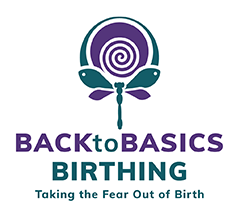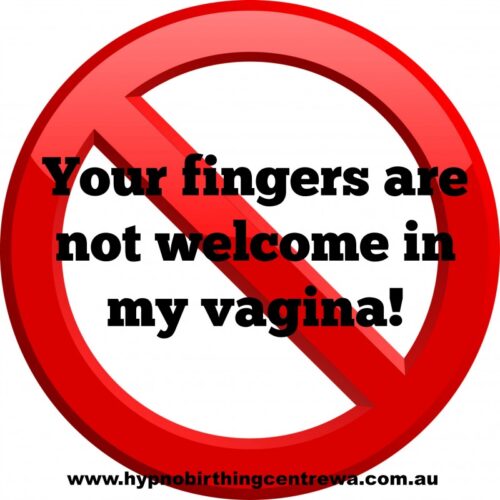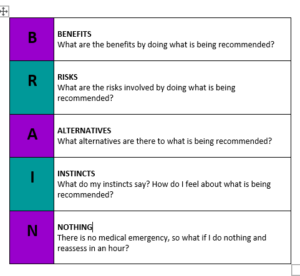Contact Vicki
If you have any questions or would just like more information please don't hesitate to get in touch by clicking the button below and filling out the contact form.
Contact Vicki

This myth that vaginal exams is beneficial has become conditioned into the minds of pregnant women so they think it is a necessary part of their labour.
Because of this myth, most hospitals will have a policy that women are to have vaginal exams every 4 hours in a risk-free birth and more frequently in a high-risk pregnancy. Some Obstetricians are even saying that the woman must be progressing at least 1cm an hour – which is old school training and very outdated, and definitely not supported by evidence.
A vaginal exam cannot tell you when your labour will start or if your baby can fit through your pelvis or how far along you are in your labour – it is very subjective.
It is also important to know that there are definitely risks to having vaginal exams like infection, because even though your midwife is using sterile gloves, bacteria can still be pushed up from the vagina to and through the cervix.
Or what about the premature rupture of membranes that can happen during a vaginal exam? This then means you are “on the clock” and if you haven’t gone into labour within a certain period of time, then you will have to have a cannula inserted and administered with antibiotics.
With hypnobirthing women we are seeing them present at hospital and only be 1cm-2cm and then give birth within a very short period of time. One of my own hypnobirthing clients was told she may as well go home as she was only 1cm but refused because she said she could feel baby moving down and getting closer (and mums know their own bodies better than anyone else) and went on to birth her baby within an hour much to the surprise of the hospital staff.
However, there are instances where a vaginal exam may be beneficial, in the case of one birth I attended as a doula the labouring mother was doing so well and having really strong surges (contractions) but baby didn’t seem to be moving down at all. The midwife on that day was amazing and was very much open to “normal birth” however she felt that something just was not right. The mum agreed to a vaginal exam, and it was found that because the membranes hadn’t ruptured the pressure from the fluid in front of the baby’s head was preventing baby from moving down. The midwife suggested she rupture the membranes, and this would make a big difference. The mum agreed and baby suddenly dropped down really quickly and was then born within an hour.
So each woman should be treated as an individual and not based on hospital policy.
There is also a 2013 Cochrane Review co-written by Hannah Dahlen, who is the Professor of Midwifery and Higher Degree Research at the University of Western Sydney, that concluded that “there was no convincing evidence to support, or reject, the use of routine vaginal examinations in labour, yet this is common practice throughout the world. More research is needed to find out if vaginal examinations are a useful measure of both normal and abnormal labour progress. If vaginal examination is not a good measure of progress, there is an urgent need to identify and evaluate an alternative measure to ensure the best outcome for mothers and babies.”
http://www.cochrane.org/CD010088/routine-vaginal-examinations-in-labour
While vaginal examinations are a useful tool if there’s a problem in labour, Professor Dahlen does not believe they should be performed routinely. “Midwives are very skilled at listening to behavioural cues, watching what women do, and hearing the sounds change,” she said. “If that doesn’t happen, then we’ll do the vaginal examination to see if there is a problem.”
Well-known midwife and researcher Sara Wickham also shares her experiences where she has seen cervical dilation decrease upon interruption of labour or if the woman feels like she is not safe or supported.
Another well-known and respected midwife and researcher is Rachel Reed, and she has another evidenced-based article on vaginal exams:
Vaginal examinations: a symptom of a cervical-centric birth culture
So, if you are concerned about being forced to have a vaginal exam at your next appointment or during labour – the magic words are “I do not consent” and legally you cannot be made to do this.
However, always use your BRAIN technique to work out if this is going to be beneficial for you at the time.

Wishing you a very calm and positive birth experience.
I have put together a list of links to information on vaginal exams, so that you can be more informed and make positive choices for your labour and birth, which are right for you….
http://pregnancy.about.com/cs/interventions/a/vaginalexam.htm
http://thedoulaguide.blogspot.com.au/2012/11/how-dilated-am-i-assessing-dilation-in.html
http://www.bellybelly.com.au/pregnancy/pelvic-exam-during-pregnancy-labour/#.VC0Nzo0cTIU
http://onlinelibrary.wiley.com/doi/10.1002/14651858.CD010088.pub2/full
http://www.essentialbaby.com.au/birth/the-ins-and-outs-of-internal-examinations-20130821-2satp.html
The Royal College of Midwives also state in their guidelines that vaginal exams are “inherently imprecise because of the potential for inter-observer variability.”
https://www.rcm.org.uk/sites/default/files/Assessing%20Progress%20in%20Labour.pdf
If you have any questions or would just like more information please don't hesitate to get in touch by clicking the button below and filling out the contact form.
Contact Vicki